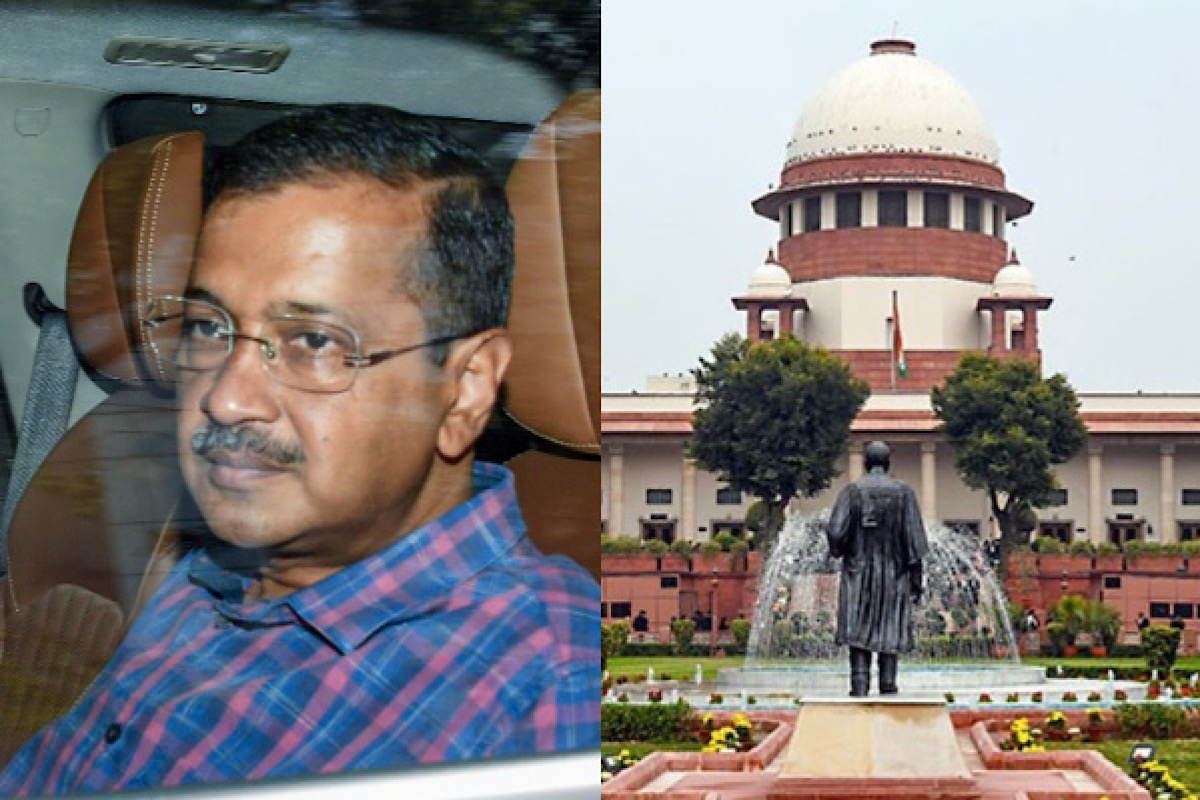The Supreme Court will on Monday (15 April) hear Delhi Chief Minister Arvind Kejriwal’s plea challenging his arrest by the Enforcement Directorate (ED) and his subsequent remand in the alleged Delhi excise policy scam.
A bench comprising Justice Sanjiv Khanna and Justice Dipankar Datta will hear Kejriwal’s appeal against the Delhi High Court’s 9 April order rejecting his plea against arrest and subsequent remand.
Advertisement
Soon after approaching the Supreme Court on 10 April 2024 to challenge the Delhi High Court’s 9 April order upholding his arrest by the ED and subsequent remand, Kejriwal’s counsel mentioned the matter for an urgent listing before a bench headed by Chief Justice D Y Chandrachud.
CJI Chandrachud, heading the bench comprising Justice J B Pardiwala and Justice Manoj Misra, said, “We will see, we will look into it.”
The Chief Minister and the Aam Aadmi Party (AAP) leader Kejriwal approached the Supreme Court to challenge the Delhi High Court order dismissing his plea against arrest by the ED and his subsequent remand in the alleged excise policy scam.
In his appeal against the High Court order, Kejriwal contended that his arrest after the announcement of the general election was “motivated by extraneous considerations”. Describing his arrest as “motivated”, Kejriwal contended that a sitting Chief Minister had been arrested in the middle of the election cycle, especially after the announcement of the schedule for the 2024 Lok Sabha election.
In his petition against the High Court order, Kejriwal said that the statements and material relied upon by the ED have been in its possession for the last nine months but why is it that the ED chose to act only when the process for the general election is underway?
These statements relied upon on the grounds of arrest were recorded by the ED between 7 December 2022 and 27 July 2023, and subsequently no further material has been collected against Kejriwal, it stated.
“Moreover, such statements and material were in possession of the Enforcement Directorate for the last nine months and still the arrest has been made illegally in the middle of the 2024 general election,” Kejriwal’s petition said.
The petition further said that Kejriwal’s arrest constitutes an “unprecedented assault on the tenets of democracy”, particularly the principles of “free and fair elections” and “federalism”, both of which are significant constituents of the basic structure of the Constitution.
In his appeal, Kejriwal stated that it is a case of illegal curtailment of his liberty.
Seeking Kejriwal’s release, the petition stated that the ED has “allowed its process to be used and misused by vested interests” as an instrument of oppression not only to “invade the liberty of the political opponents” in the midst of the 2024 general election but also “to tarnish their reputation and self-esteem”.
“The petitioner’s arrest, therefore, bears serious, irreversible ramifications for the future of electoral democracy in India, for if the petitioner is not released forthwith to participate in the upcoming elections, it will establish a precedence in law for ruling parties to arrest heads of political opposition on flimsy and vexatious charges before elections, thereby eroding the core principles of our Constitution,” the petition stated.
Seeking the declaration that Kejriwal’s arrest is illegal, the petition stated that such lawlessness cannot be allowed to be perpetrated under any circumstances.
The petition against the High Court’s 9 April order stated that there is no material in possession of the Enforcement Directorate on the basis of which any inference of guilt could be made out under section 19 of the Prevention of Money Laundering Act (PMLA).
The arrest was made solely relying on subsequent, contradictory, and highly belated statements of the co-accused who have now turned approvers, the appeal stated.
“There was no legal or factual basis for “reason to believe” or “material in possession” to consider the petitioner “guilty” for effecting an arrest. Obviously, there was no necessity for the arrest on 21 March 2024 based on this “material”, the appeal stated.
Also, no statement was recorded before the arrest on 21 March 2024 to seek any explanation about this old material, before deciding on the requirements of section 19 of the PMLA, it added.
Earlier, Kejriwal had approached the Supreme Court against his arrest by the ED, but later withdrew his petition to approach the trial court.
On April 9, the Delhi High Court while rejecting Kejriwal’s plea against his arrest and consequent remand said that “the arrest was legal”. The High Court had said, “The court is of the view that the arrest of Arvind Kejriwal was not in contravention of legal provisions. The remand cannot be held to be illegal.”
On Delhi Chief Minister’s contention regarding the timings of his arrest ahead of the general election, the High Court had said that the law applied equally to all and courts were concerned with “constitutional morality” and not “political morality”.
“The material collected by the ED reveals that Kejriwal conspired and was involved in the formulation of excise policy and used the proceeds of crime. He is also allegedly involved in a personal capacity in formulating policy and demanding kickbacks and secondly in the capacity of the national convener of the AAP,” the High Court had said while rejecting Kejriwal’s plea against his arrest and remand.
Kejriwal was arrested by the ED on 21 March. He was produced before a special court in Delhi which initially remanded him in ED’s custody till 28 March and the same was extended till 1 April 2024. Thereafter, he was sent to judicial custody.









